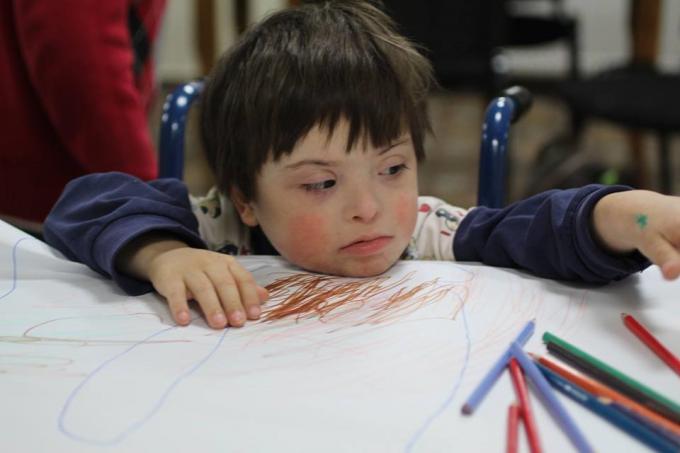Our Ongoing Projects
Community-based Services for Children with Disabilitiesfor over 15 years we work in disability field strive to establish sustainable, context- and needs-based services for children with disabilities, strengthen families and empower state authorities and local NGO actors to deliver, sustain and replicate best practices. Within the MACF funded project, in partnership with local NGO Anika we are establishing high quality day care centers for children with disabilities. Through these services we provide community based multi-disciplinary rehabilitation to children with disabilities and enable their inclusion in school and community life; westrengthen families through providing constant support and training and we increase capacity of the State to address the gaps faced by the children with disabilities through facilitating coordination and collaboration among different state actors as well as through advocacy and public awareness. We supported government to develop National Inclusive Education strategy and Action Plan for 2018-2020and a multi-disciplinary assessment tool to ensure the identification of acute needs of children with disabilities as well as relevant competencies/abilities.
Alternative Care for Infants with Disabilities aims at ending the institutionalization of infants with severe disabilities through developing alternative care options, gatekeeping, monitoring systems, and policy advocacy work, as well as training and developing the capacity of the service providers of alternative small-scale residential units for infants and young children.As part of UNICEF’s larger program we have taken responsibility for training and developing the capacity of the service providers in small-scale alternative residential units, capacity building of medical staff and on-job support of care providers to ensure that they have sufficient knowledge and skills to provide quality care, supported through our on-the-job advice and continuing support. The training manual and guidance on Child Oriented Care and a Guidance on the role of Paediatricians in early intervention and developmental issues of children with disabilities developed under the project were endorsed by the state.
Institutionalization, replication and dissemination of Child-centered Inclusive Disaster Risk Reductioninterventions in South Caucasus focuses on ensuring sustainability and wider geographical coverage of the best practices and models attained by all partners in working on DRR. Since 2012 we implement ECHO funded project in four regions of Georgia. With our joint efforts state recognized importance of inclusive DRR putting it in state policies and practices. We developed Inclusive DRR training modules, guidebooks, DRR dictionary on Georgian sign language, trained teachers, developed Inclusive DRR cartoons and TV shows, and elaborated DRR standards for preschool institutions and its monitoring tool. We build capacities of government structures and advocate formalization of IDRR mechanisms for teachers’ training at basic educational levels.
Improving Preschool Education in Georgia through Social Accountability Processes aims at improving the monitoring system of preschool education service provision and adequate resource allocation through introduction of the monitoring and feedback mechanisms and establishing a National Preschool Association (NPA) to extend the benchmarking approach and other social accountability practices to all Georgian municipalities and preschools. Project is funding from the WB Global Partnership from the Social Accountability. Together with our partner NGO Civitas Georgica we will address challenges of decentralized preschool system in Georgia, to design and establish monitoring and feedback mechanisms for all relevant stakeholders to assess and collaboratively improve pre-school education services in Georgian municipalities.
Supporting Human Rights and Protection of IDPs for over 5 years, with the financial support of BPRM we work with displaced Georgian families, their children, and youth in the IDP settlements to ensure their effective community-based referral, psychosocial counseling, youth empowerment and awareness rising on Gender Based Violence. OurProtection Referral Teams reach out to the population to provide them with the most current information on their rights and entitlements, including the existing medical, social, educational, and legal services in the region.
Youth UP 4 change: better skills for successful transition contributes to developing the entrepreneurial potential and increased access to education and training opportunities of disadvantaged youth for greater employability and advocates for coherent and cross-sectorial youth policies at local, regional and national levels. Two-year program is financed by European Commission’s EU4Youth Program and implemented through local partner Children and Youth Development Center. Extensive capacity building activities for youth will rely on comprehensive labor market assessment to reveal the specific needs among young people. The youth empowerment will be further strengthened by support to non-formal educational institutions and other relevant stakeholders supporting social-economic integration of youth.

 Georgia
Georgia